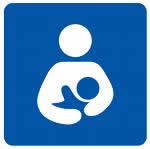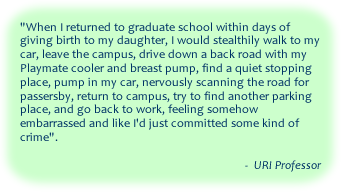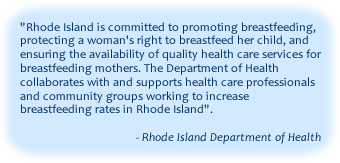
Rhode Island legislation protects a woman’s choice to breastfeed by requiring an employer to make “a reasonable effort to provide a private, secure, and sanitary room or other location in close proximity to the work area, other than a toilet stall, where an employee can express her milk or breastfeed her child” (R.I. General Laws §23-13.2-1). Thanks to the support of the Elsevier Foundation, the National Science Foundation, and the URI Administration, ADVANCE and its Work-Life Committee (which is now institutionalized as the URI Work-Life Committee) launched a lactation program during the spring of 2008.
Lactation Facilities at URI
URI’s first Lactation Facility is located
at 001 Carlotti Hall, KIngston campus
on the ground floor in the Office of Research and Economic Development

Look for the international breastfeeding logo designating each site.
- The ADVANCE Lactation Room is a small, comfortable room with glazed windows and a door that locks. It has a comfortable chair, a sink, radio, a hospital-grade electric Medela Symphony breast pump, containers to store milk, a refrigerator, bottled water, and a small resource library.
- A Lactation Consultant is available through the ADVANCE office, as well as support materials and other resources.
- The room is available to any URI employee or student who needs a clean, private, comfortable space to pump breastmilk.
- Hours: 9 a.m. to 4 p.m. By appointment only. Please call 874-9422 for more information, or if no answer, 874-4576. Walk-ins are OK, but room is locked and someone must be present to register the user and unlock the door, so calling ahead is advised.
- All users must register, fill out appropriate paperwork, and receive information on the use of the pump and other amenities.
Other Kingston campus sites:
Memorial Union
- small, clean, lockable room within the women’s restroom on the ground floor
- Walk-in only. Users must provide their own pump, and must sign in.
- Hours: 7:30 a.m. – 12:30 midnight
Pharmacey Buidling (scheduled for 2011); other sites being explored
Locations in other campus:
Narragansett Bay Campus – Room 017, Ocean Science and Exploration Center
- This room is located on the ground floor and has a sink, shower and will have a large comfortable chair for sitting (scheduled for April 2009).
- It is adjacent to the bathrooms on the ground level and is publicly accessible. The room is the size of a typical unisex bathroom and is designed for one person with a lockable door.
- Walk-in only. Users must provide their own pump, and must sign in.
- Hours: 7:30 a.m. – to 6:00 p.m. Because this is a new building, hours subject to change as office routines become established
Feinstein Providence Campus – Room 218, Faculty Restroom Lounge
- Clean, comfortable, lockable, handicap-accessible restroom with chair, table, sink, some informational resources (scheduled for April 2009)
- Open to all nursing mothers for pumping – students, staff and faculty.
- Walk-in only. Room is kept locked; key can be obtained at Student Services desk on ground floor; call (401) 277-5000 for more information.
- Users must provide their own pump, and must sign in.
- Hours: 7:30 a.m. – 8:00 p.m.
URI Lactation Resources Brochure
URI ADVANCE Lactation Program Proposal
Interesting Facts about Breastfeeding and Breastpumping
Breastfeeding is one of the most natural and beneficial activities for mom and baby. It is a choice many mothers are making today, as it results in signficant health benefits for both child and mother, as well as emotional benefits, economic benefits, and environmental benefits.
| Why are Lactation Centers needed at URI? |
- There is an ever-increasing number of women and nursing mothers in the workforce.
- An equitable work environment must accomodate parent’s needs.
- We must eliminate the cultural contradition that women in our culture are strongly encouraged to breastfeed, are economically pressured to return to work/school quickly, yet are not provided the time or space to pump breastmilk while at work or school.
- The needs of dual earner families should be met.
- Tenure track overlaps with ‘parent track’ for women, resulting in an un-level playing field.
- The next generation of workers in Rhode Island need a healthy start.
| What benefits do Breastfeeding and Lactation Centers provide to the Institution? |
- Female faculty, staff, and students would have the ability to return to work/school earlier and remain there during the workday.
- Lower turnover rates and higher productivity, satisfaction, loyalty, and morale (US Breastfeeding Committee, 2002)
- Reduces cost of healthcare by promoting healthier moms and babies (US Breastfeeding Committee, 2002):
- excess use of health care services attributable to formula feeding costs between $331 and $475 per infant in babies who never receive breastmilk.
- Companies that have adopted breastfeeding support programs have noted cost savings of $3 for every $1 invested in breastfeeding support.
- Insurers pay a least $3.6 billion each year to treat diseases and conditions preventable by breastfeeding.
- Less sick time will be taken because of healthier babies:
- parental absenteeism is 3 times higher for formula-fed infants as compared to breastfed babies (Cohen et al, 1995).
- Psychological benefits, including reduced stress, for women workers/students
- Reduces tax burden on communities & government to ensure children are properly fed.
- On a larger scale, there would be a decreased environmental burden, and a healthier new generation of students and workers
- Positive public relations
| Benefits to Babies who Breastfeed |
- Provides most complete and optimal mix of nutrients & antibodies.
- Keeps pace with infant’s growth and changing nutritional needs.
- Protects against stomach upsets, asthma, meningitis, childhood lymphoma, Crohn’s disease and ulcerative entercolitis.
- Reduces risk of childhood diabetes and SIDS (Sudden Infant Death Syndrome)
- Increases bone density.
- Reduces risk of heart disease later in life.
- Develops higher IQ’s.
- Improves brain & nervous system development.
- Improves emotional development.
- Promotes special warm bonding & emotional relationship with mom.
| Benefits to Moms who Breastfeed |
- Protects against osteoporosis and hip fracture later in life.
- Reduces risk of breast, ovarian and endometrial cancer and anemia.
- Helps return mom’s body to its pre-pregnancy state faster.
- Breastmilk is free, thus reducing or eliminating the cost of formula (conservative estimates for one year’s worth of formula are around $2,500).
- Breastfed babies are sick less, thus reducing healthcare costs to family and requiring less time-off from work.
- Promotes special emotional relationship and bonding with baby.
| URI is proud to join a national effort to support breastfeeding… |

The Center for Disease Control and Prevention has publicly stated its ongoing commitment to increasing breastfeeding rates in the United States. This goal can only be achieved by providing support for breastfeeding mothers and their families. Education, training, technical assistance, and funding are necessary to carry out this objective.

|
References & Resources (note: The Carlotti Lactation Room houses a small breastfeeding resource lending library) |
|
|
|
|
|
|
|
|
|
|
|
|
 URI Homepage
URI Homepage






